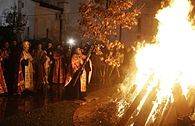Portal:Serbia/Selected article/November

The badnjak (Cyrillic: бадњак, Serbian pronunciation: [ˈbǎdɲaːk]), also called veseljak (весељак, [ʋɛˈsɛ̌ʎaːk], literally "jovial one" in Serbian), is represented by three types of objects in Serbian Christmas celebrations. The oldest type is a log brought into the house and placed on the fire on the evening of Christmas Eve, much like a yule log in other European traditions. The tree from which the log is cut, preferably a young and straight oak, is ceremonially felled early on the morning of Christmas Eve. The felling, preparation, bringing in, and laying on the fire, are surrounded by elaborate rituals, with many regional variations. The burning of the log is accompanied by prayers that the coming year brings food, happiness, love, luck, and riches. The log burns on throughout Christmas Day, when the first visitor strikes it with a poker or a branch to make sparks fly, requesting that the family's happiness and prosperity be as abundant as the sparks. Another type of the badnjak that has developed among the Serbs has mostly replaced the traditional log, whose burning is usually unfeasible in modern homes. It is a cluster of oak twigs with brown leaves attached, with which the home is decorated on the Eve.
